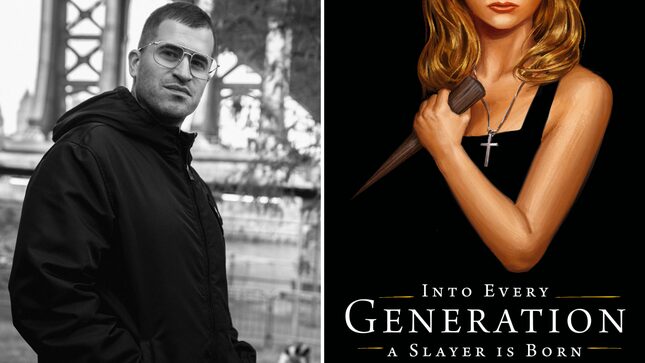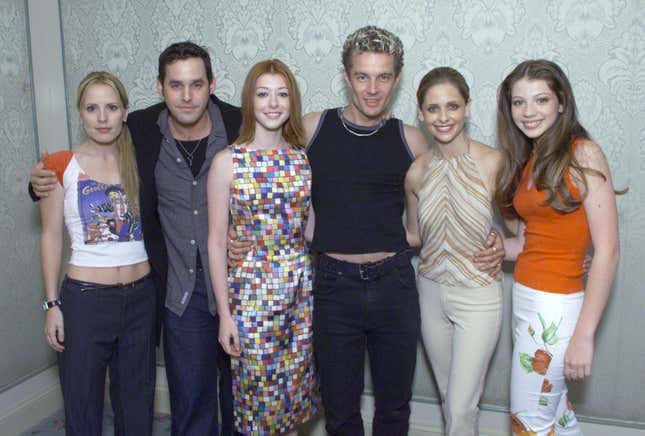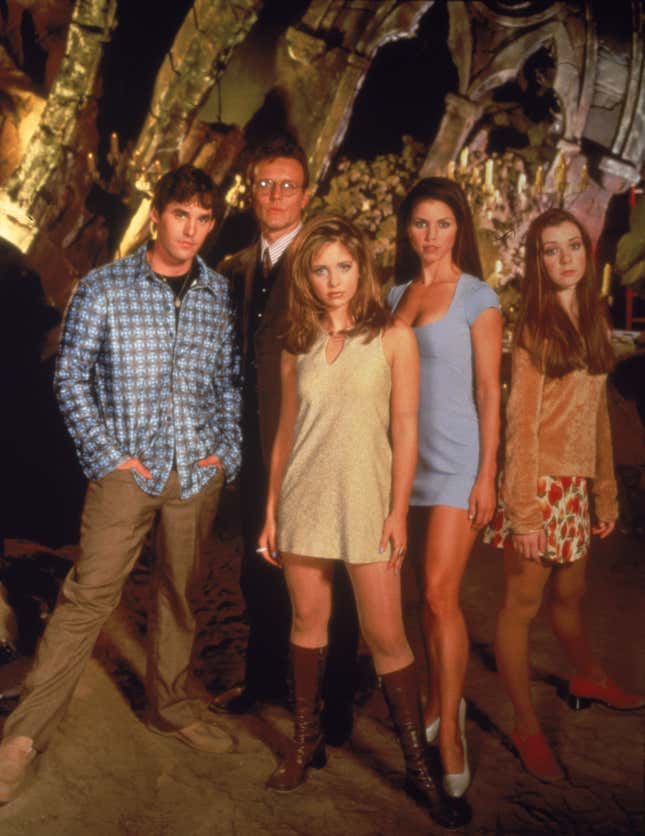The First Reported ‘Buffy the Vampire Slayer’ Book Is a Loving Critique of a Complicated Show
Evan Ross Katz excavates Buffy's legacy—including the Joss Whedon allegations—through new interviews with the cast, crew, and fans like Stacey Abrams.
BooksEntertainment

Evan Ross Katz was already at work on his book about the cult hit series Buffy the Vampire Slayer when Charisma Carpenter, one of the show’s stars, posted a statement to Twitter. In the account, which she published on February 10 of last year, she accused Buffy creator Joss Whedon of “abus[ing] his power on numerous occasions” during her run on the show and its spin-off, Angel. Carpenter had become pregnant while she appeared on Angel, and Whedon, she wrote, called her “fat,” asked if she was “going to keep it,” and fired her after she gave birth. Ross Katz had been scheduled to interview Carpenter’s former Buffy co-star Alyson Hannigan the following day. That interview, he writes in the book, was canceled. Not only that, the new allegations against Whedon “closed off access to several of the actors that I did previously have locked in,” Ross Katz told Jezebel.
Carpenter’s statement would reignite discussion of Whedon’s behavior towards the Buffy cast and crew, in ways that reshaped Ross Katz’s book Into Every Generation a Slayer Is Born, which is out today. The interview with Hannigan was never rescheduled, but other former members of Buffy world, including Dopesick showrunner Danny Strong, wanted to be re-interviewed to discuss the allegations and make clear their support for Whedon’s accusers. Ross Katz had always known that there would be a chapter in the book about Whedon, who’s been the subject of controversy after controversy in recent years. But, he said, “I did not know that that would be the longest chapter in the book.”
Buffy has inspired miles of spilled digital ink on Reddit and other fan forums, and an entire academic micro-discipline that has produced conferences, books, and journal articles with titles like “Buffy the Vampire Slayer: Technology, Mysticism, and the Constructed Body.” Still, Ross Katz’s effort is the first book-length reported treatment of the show. Arriving 25 years after the series’ premiere and hot on the heels of the latest Whedon controversy, it offers an in-depth look at the creation and legacy of one of television’s most beloved shows, through interviews with cast members like Carpenter and Sarah Michelle Gellar, and Buffy experts and fans including Stacey Abrams. It’s a reckoning with a show that changed television, and with its creator, who’s been accused again and again of serious professional misconduct.

The odd thing about creations that reshape pop culture is that their influence renders their novelty almost invisible. TV since Buffy has featured so many “strong female leads,” quippy, mystery-solving friend groups, rapid-fire references, and salutes to nerd culture that it’s easy to forget when watching in 2022 that this was one of the series that set the mold. Debuting in 1997 when TV was still the boob tube and its Golden Age only a glimmer in David Chase’s eye, Buffy starred Gellar as its titular heroine, a 16-year-old former cheerleader turned vampire slayer who happens to be the only person capable of saving the world from a bevy of supernatural nasties. Buffy seemed to draw on aspects of the best popular films of the mid-’90s—the Valley girl redemption of Clueless, the self-aware horror narratives of Scream—and combine them with the long-form framework television provides.
Given the show’s popularity and the fact that Whedon can’t seem to stay out of the news, it’s a bit surprising that it took this long for a reported book about the series to be written. One factor that may have stymied earlier attempts to tell the full story of the series is that many people at the heart of the show don’t seem to be fans of talking about it. Ross Katz points out that the stars of some of Buffy’s most beloved contemporaries, like Charmed or Dawson’s Creek, are largely household names. The cast of Buffy, though it included a genuine movie star (SMG) and two of television’s most recognizable actors (Hannigan and David Boreanaz, who’d go onto appear in How I Met Your Mother and Bones), featured others whose careers never reached similar heights. They’ve had “a weird trajectory,” said Ross Katz, and for many, Buffy is either a project long in their rearview that they’re tired of talking about, or a potentially painful career high point that they’re tired of talking about.
When it came to booking those elusive interviews, Ross Katz was given a hand by Gellar herself. Growing up, he was a super fan—as he writes in Into Every Generation, he sent her a fan letter after the release of Cruel Intentions, which his parents hadn’t actually allowed him to watch. (He followed with another fan letter, in which he apologized for fibbing.) They’d later meet through a mutual friend, and he interviewed Gellar for Oprah Magazine in 2019.
-

-

-

-

-

-

-

-

-

-

-

-

-

-

-

-

-

-

-

-

-

-

-

-

-

-

-

-

-

-

-

-

-

-

-

-

-

-

-

-









































